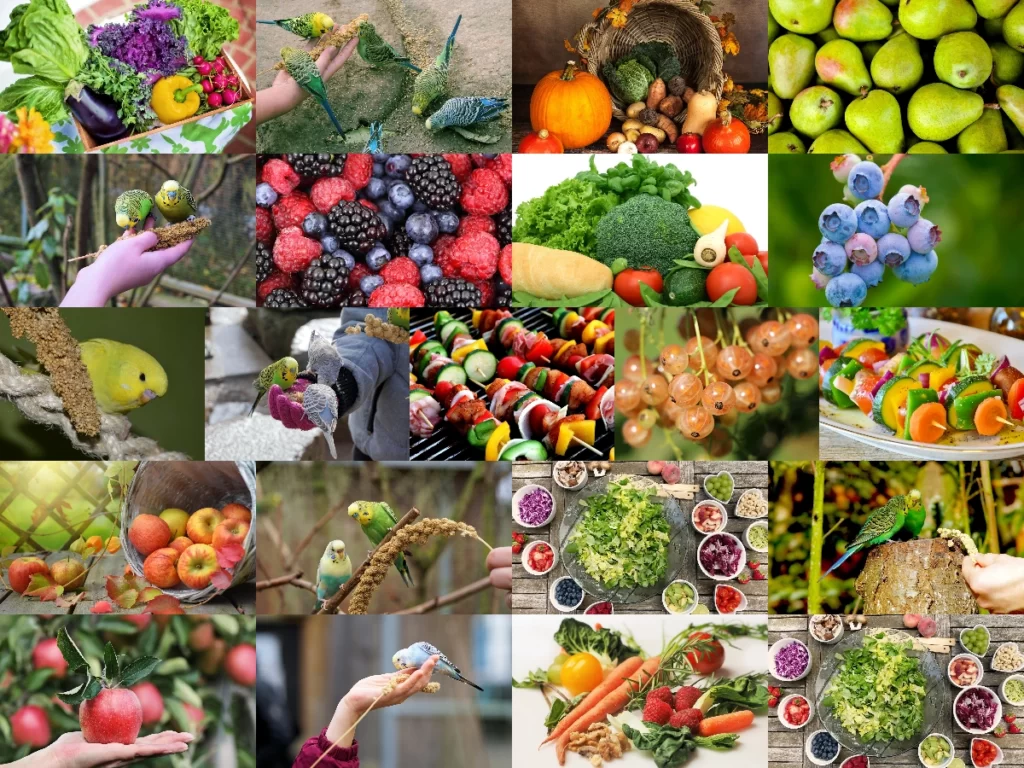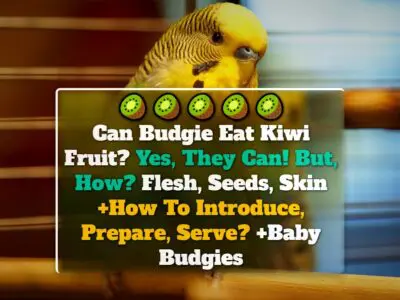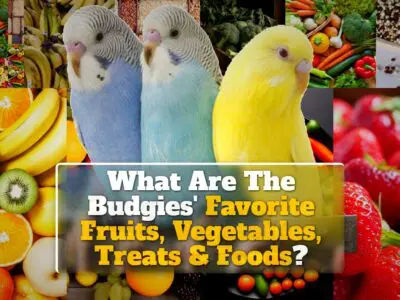Budgies may avoid eating fruits and vegetables due to unfamiliarity with new foods, incorrect presentation of food, inherent seed preferences, potential health issues, lack of variety in the diet, specific taste or texture preferences, or freshness of the produce.
Understanding these factors can help improve their dietary habits.
As a multi-time budgie owner, I’ve often pondered: “Why doesn’t my budgie eat fruit & vegetables?”
For fellow bird lovers facing the same issue, I’ve distilled my experiences and insights into this comprehensive analysis of seven reasons why budgies might avoid fruits and vegetables.

1. Unfamiliarity with New Foods
Birds are much like us humans when it comes to trying new things – sometimes, they’re hesitant and wary.
This rings true especially for budgies. Budgies, being creatures of habit, may show a marked resistance to unfamiliar foods.
If your budgie is used to a diet of seeds, introducing fruits and vegetables can be a challenge.
It’s almost as if they don’t recognize these new additions as food!
- Resistance to Change: Budgies, by nature, are creatures of habit. A sudden change in their diet can be daunting and lead to them refusing new foods, especially if they’re vastly different from what they’re used to.
- Fear of the Unknown: Birds can be skeptical of things they’ve never seen before, including new food types. This unfamiliarity can make them nervous, leading them to avoid the new foods altogether.
- Preference for Known Foods: Budgies can become quite attached to their usual diet, and they might simply prefer their familiar seeds over the strange new fruits or veggies.
The challenge here is to familiarize your budgie with new foods gradually and patiently, ensuring they understand these foods are not threats but tasty additions to their diet.
2. Incorrect Food Presentation
Food presentation plays a significant role in whether your budgie will accept a new food item or not.
Just as we eat with our eyes first, the same goes for these little birds.
Budgies are attracted to colorful and well-presented foods.
- Size Matters: Budgies may not recognize large pieces of fruits or vegetables as food. Chopping them into small, bite-sized pieces can make them more appealing and manageable.
- Color Attraction: Budgies, with their excellent color vision, are drawn to vibrant hues. Use this to your advantage by presenting them with brightly colored fruits and vegetables.
- Texture: The texture can be a deciding factor. Some budgies may prefer crunchy vegetables over softer ones, or vice versa.
- Mixing Foods: Combining new foods with their favorite seeds can help in making the transition smoother. This way, they can associate the new foods with their favorites.
Remember, the key to getting your budgie to eat fruits and vegetables lies in how these foods are presented.
A little creativity can go a long way in ensuring your bird gets a balanced diet.
3. Preference for Seeds
Seed addiction can be a real hurdle when trying to get your budgie to diversify its diet.
Budgies have a natural preference for seeds, making it a formidable task to introduce fruits and vegetables.
- Seed Addiction: Budgies, in the wild, survive primarily on seeds and grains. This hardwired preference can lead to a “seed addiction,” making it a challenge to coax them to eat anything else.
- Taste Preference: Seeds are rich in fats and have a certain flavor profile that budgies are very fond of. The flavors of fruits and vegetables might not initially stand up to their favorite seeds.
- Hard to Break Habits: Habitual eating of seeds makes it difficult for budgies to accept new foods, even if those foods are beneficial for them.
4. Potential Health Issues
While a budgie’s refusal to eat fruits and vegetables can stem from their habits or preferences, there are times when underlying health issues could be the cause.
- Digestive Troubles: Just like us, budgies can experience digestive troubles. If your bird suddenly starts avoiding certain foods, it might be experiencing discomfort while digesting them.
- Illness: Certain diseases can cause a loss of appetite in budgies. If your budgie is not only avoiding fruits and vegetables but also showing a lack of interest in its regular diet, it may be time to consult a vet.
- Age: Older budgies might have difficulty adjusting to new foods due to changes in their digestive system.
- Beak Problems: Issues with their beaks can make it hard for budgies to eat certain foods. If your budgie struggles with eating or looks uncomfortable while trying to eat, you might want to check its beak health.
5. Lack of Variety in Fruits and Vegetables
Budgies, like most animals, crave variety in their diet. However, if you are providing the same fruits and vegetables repetitively, it might lead to disinterest in these foods.
The reasons behind this include:
- Monotonous Taste: Budgies have a sophisticated palate. Offering the same fruits or vegetables can become tiresome due to the lack of varying flavors.
- Nutritional Imbalance: Different fruits and vegetables have diverse nutritional profiles. Feeding the same kind consistently might not cater to all the nutritional requirements of your budgie.
- Instinctual Need for Variety: In the wild, budgies would encounter a wide array of food sources. Hence, a lack of variety might go against their instinctual expectations.
Remember, it’s crucial to introduce diverse, safe-to-eat fruits and vegetables to your budgie, making sure to rotate them regularly.
6. Taste and Texture Preferences
Individual budgies have unique taste and texture preferences. These preferences might make them refuse certain fruits and vegetables.
Here’s a brief on the key aspects:
- Flavor Preference: Some budgies might favor sweet fruits, while others might prefer the savory taste of vegetables.
- Texture Preference: The texture of the food can also influence a budgie’s eating habits. Some might enjoy crunchy vegetables, while others might like soft fruits.
Understanding these preferences requires keen observation of your budgie’s eating habits. Over time, you can use this knowledge to offer food that aligns with your budgie’s preferences.
7. Freshness of Fruits and Vegetables
Budgies are discerning eaters and may refuse to eat fruits and vegetables that are not fresh.
Freshness is a key determinant of a budgie’s interest in food. Here are some reasons why:
- Taste: Fresh fruits and vegetables are typically more flavorful, which could be more appealing to budgies.
- Texture: The texture of fresh produce is generally superior. As fruits and vegetables lose their freshness, they can become soft and less appealing to some budgies.
- Nutrition: Fresh produce contains higher levels of nutrients. As fruits and vegetables age, they can lose some of their nutritional value.
Therefore, always ensure that the fruits and vegetables you provide are as fresh as possible to maintain your budgie’s interest.
Faqs
How Can I Encourage My Budgie to Try New Foods?
Introducing new foods to a budgie requires patience and creativity. Start by presenting the new food alongside their favorite seeds.
You can also try chopping the fruits or vegetables into small pieces and mixing them with their usual seed mix.
Over time, gradually increase the proportion of new food while reducing the amount of seeds.
Why Might My Budgie Reject Certain Food Presentations?
Budgies can be quite specific about how their food is presented. Some budgies may prefer their fruits and vegetables finely chopped, while others might enjoy larger pieces to nibble on.
Experiment with different presentation methods to find out what your budgie prefers.
How Do Budgies’ Taste and Texture Preferences Influence Their Food Choices?
Just like humans, budgies have individual taste and texture preferences. Some budgies might enjoy the crunchiness of certain vegetables, while others might prefer the soft texture of fruits.
Observing your budgie’s eating habits can help you understand their preferences and tailor their diet accordingly.



